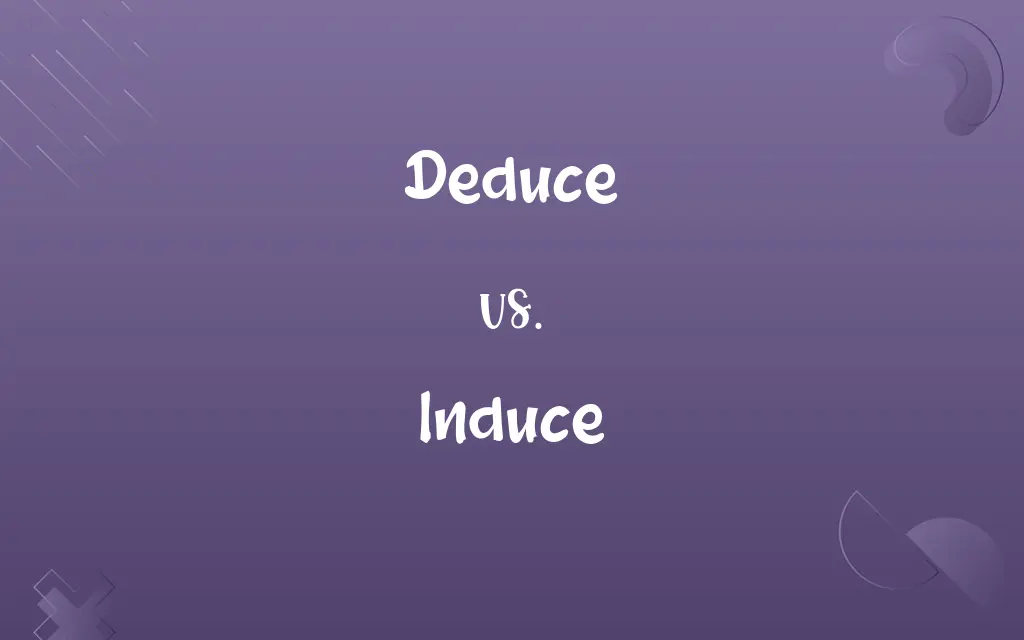Deduce vs. Induce: Know the Difference

By Shumaila Saeed || Updated on December 25, 2023
Deduce is to reach a specific conclusion from general principles or evidence. Induce is to draw a general conclusion from specific observations or evidence.

Key Differences
Deduce involves starting with a general statement or principle and applying it to a specific case to arrive at a conclusion. It's a top-down approach in reasoning. Induce, on the other hand, involves observing specific instances and inferring a general principle from them, representing a bottom-up approach in reasoning.
Shumaila Saeed
Nov 28, 2023
When you deduce, you use existing principles or premises to logically arrive at a specific conclusion; it's a process of reasoning deductively. In contrast, to induce is to gather separate pieces of evidence and form a general conclusion, which might not be conclusively proven, but is likely given the evidence.
Shumaila Saeed
Nov 28, 2023
Deduction is often seen in mathematics and formal logic, where conclusions are inevitable and certain if the premises are true. Induction, conversely, is common in scientific method, where observations lead to hypotheses that need further testing, making induction less certain but more exploratory.
Shumaila Saeed
Nov 28, 2023
In deduction, the conclusion cannot be false if the premises are true, ensuring certainty in the outcome. Induction, however, deals with probabilities; even with true premises, the conclusion might not necessarily be true, making it inherently less certain but more open to new possibilities.
Shumaila Saeed
Nov 28, 2023
Deductive reasoning is critical in scenarios where accuracy and logic are paramount, like legal arguments or mathematical proofs. Inductive reasoning is vital in fields like science, where it is used to formulate hypotheses and theories based on observed patterns and data.
Shumaila Saeed
Nov 28, 2023
ADVERTISEMENT
Comparison Chart
Type of Reasoning
Logical, from general to specific
Empirical, from specific to general
Shumaila Saeed
Nov 28, 2023
Certainty of Conclusion
Conclusions are certain if premises are true
Conclusions are probable, not certain
Shumaila Saeed
Nov 28, 2023
Typical Use
In mathematics, logic, and law
In scientific methods and hypothesis formation
Shumaila Saeed
Nov 28, 2023
Relation to Evidence
Based on accepted premises
Based on observation and experimentation
Shumaila Saeed
Nov 28, 2023
Outcome Predictability
High, with clear outcomes
Variable, often leading to new hypotheses
Shumaila Saeed
Nov 28, 2023
ADVERTISEMENT
Deduce and Induce Definitions
Deduce
To infer from a general principle.
From the laws of physics, we can deduce how planets orbit the sun.
Shumaila Saeed
Nov 28, 2023
Induce
To produce or cause (an effect or action).
The speech was intended to induce a change in policy.
Shumaila Saeed
Nov 28, 2023
Deduce
To determine something by deduction.
He deduced his answer by eliminating the impossible options.
Shumaila Saeed
Nov 28, 2023
Induce
To bring on or about.
Certain conditions induce the chemical reaction.
Shumaila Saeed
Nov 28, 2023
Deduce
To reach a logical conclusion by reasoning.
She deduced that the meeting was canceled, as the room was empty.
Shumaila Saeed
Nov 28, 2023
ADVERTISEMENT
Induce
To derive by inductive reasoning.
From the data, scientists induced a possible cause for the phenomenon.
Shumaila Saeed
Nov 28, 2023
Deduce
To derive as a conclusion from something known or assumed.
From the clues, the detective deduced the identity of the culprit.
Shumaila Saeed
Nov 28, 2023
Induce
To bring about or stimulate the occurrence of.
The medication is used to induce sleep.
Shumaila Saeed
Nov 28, 2023
Deduce
To trace the derivation of.
The linguist deduced the origin of the word from ancient texts.
Shumaila Saeed
Nov 28, 2023
Induce
To lead or move, as to a course of action, by influence or persuasion.
Shumaila Saeed
Oct 19, 2023
Induce
To bring about or stimulate the occurrence of; cause
A drug used to induce labor.
Shumaila Saeed
Oct 19, 2023
Deduce
To infer from a general principle; reason deductively
Deduced from the laws of physics that the new airplane would fly.
Shumaila Saeed
Oct 19, 2023
Deduce
(transitive) To reach (a conclusion) by applying rules of logic or other forms of reasoning to given premises or known facts.
Shumaila Saeed
Oct 19, 2023
Induce
To produce (radioactivity, for example) artificially by bombardment of a substance with neutrons, gamma rays, and other particles.
Shumaila Saeed
Oct 19, 2023
Deduce
(transitive) To examine, explain, or record (something) in an orderly manner.
Shumaila Saeed
Oct 19, 2023
Induce
(Biochemistry) To initiate or increase the production of (an enzyme or other protein) at the level of genetic transcription.
Shumaila Saeed
Oct 19, 2023
Induce
(Genetics) To cause an increase in the transcription of the RNA of (a gene).
Shumaila Saeed
Oct 19, 2023
Induce
(transitive) To lead by persuasion or influence; incite or prevail upon.
Shumaila Saeed
Oct 19, 2023
Deduce
To take away (something); to deduct, to subtract (something).
To deduce a part from the whole
Shumaila Saeed
Oct 19, 2023
Induce
(transitive) To cause, bring about, lead to.
His meditation induced a compromise.
Opium induces sleep.
Shumaila Saeed
Oct 19, 2023
Induce
(physics) To cause or produce (electric current or a magnetic state) by a physical process of induction.
Shumaila Saeed
Oct 19, 2023
Deduce
To take away; to deduct; to subtract; as, to deduce a part from the whole.
Shumaila Saeed
Oct 19, 2023
Deduce
To derive or draw; to derive by logical process; to obtain or arrive at as the result of reasoning; to gather, as a truth or opinion, from what precedes or from premises; to infer; - with from or out of.
O goddess, say, shall I deduce my rhymesFrom the dire nation in its early times?
Reasoning is nothing but the faculty of deducing unknown truths from principles already known.
See what regard will be paid to the pedigree which deduces your descent from kings and conquerors.
Shumaila Saeed
Oct 19, 2023
Induce
To lead in; to introduce.
The poet may be seen inducing his personages in the first Iliad.
Shumaila Saeed
Oct 19, 2023
Induce
To lead on; to influence; to prevail on; to incite; to persuade; to move by persuasion or influence.
He is not obliged by your offer to do it, . . . though he may be induced, persuaded, prevailed upon, tempted.
Let not the covetous desire of growing rich induce you to ruin your reputation.
Shumaila Saeed
Oct 19, 2023
Induce
To bring on; to effect; to cause; as, a fever induced by fatigue or exposure; anaphylactic shock induced by exposure to a allergen.
Sour things induces a contraction in the nerves.
Shumaila Saeed
Oct 19, 2023
Induce
To produce, or cause, by proximity without contact or transmission, as a particular electric or magnetic condition in a body, by the approach of another body in an opposite electric or magnetic state.
Shumaila Saeed
Oct 19, 2023
Induce
To generalize or conclude as an inference from all the particulars; - the opposite of deduce.
Shumaila Saeed
Oct 19, 2023
Induce
To cause the expression of (a gene or gene product) by affecting a transcription control element on the genome, either by inhibiting a negative control or by activating a positive control; to derepress; as, lactose induces the production of beta-galactosidase in Eschericia coli..
Shumaila Saeed
Oct 19, 2023
Induce
Cause to do; cause to act in a specified manner;
The ads induced me to buy a VCR
My children finally got me to buy a computer
My wife made me buy a new sofa
Shumaila Saeed
Oct 19, 2023
Induce
Cause to occur rapidly;
The infection precipitated a high fever and allergic reactions
Shumaila Saeed
Oct 19, 2023
Repeatedly Asked Queries
What is deductive reasoning?
It's reasoning from general principles to specific cases, ensuring a certain conclusion if premises are true.
Shumaila Saeed
Nov 28, 2023
Are inductive conclusions always certain?
No, inductive conclusions are probable and subject to revision based on new evidence.
Shumaila Saeed
Nov 28, 2023
Can deductive conclusions be false?
If the premises are true, deductive conclusions are certain and cannot be false.
Shumaila Saeed
Nov 28, 2023
Can induction lead to false conclusions?
Yes, since induction deals with probabilities, it can lead to false conclusions if the underlying assumptions or data are flawed.
Shumaila Saeed
Nov 28, 2023
Is deduction suitable for hypothesis testing?
Deduction is more about applying known principles than testing new hypotheses.
Shumaila Saeed
Nov 28, 2023
Does deduction require prior knowledge?
Yes, it relies on existing principles or premises.
Shumaila Saeed
Nov 28, 2023
What is inductive reasoning?
It's reasoning from specific instances to form general principles, often leading to probable conclusions.
Shumaila Saeed
Nov 28, 2023
Is deductive reasoning infallible?
It is, provided the initial premises are true and the reasoning is logically sound.
Shumaila Saeed
Nov 28, 2023
Can induction be used in mathematics?
Induction, especially mathematical induction, is used for proving statements about natural numbers.
Shumaila Saeed
Nov 28, 2023
How is deduction used in mathematics?
It's used to derive specific results from general axioms or theorems.
Shumaila Saeed
Nov 28, 2023
How is induction used in science?
It's used to form hypotheses and theories based on observed data and experimentation.
Shumaila Saeed
Nov 28, 2023
Can inductive reasoning be used to predict future events?
Yes, but the predictions are probabilistic, not certain.
Shumaila Saeed
Nov 28, 2023
What is an example of an inductive argument?
"All observed swans are white; therefore, all swans may be white."
Shumaila Saeed
Nov 28, 2023
Is deductive reasoning more reliable than inductive reasoning?
It's more reliable in terms of certainty, but induction is better for exploring new ideas.
Shumaila Saeed
Nov 28, 2023
Is deduction more about logic or observation?
Deduction is more about logic and applying established principles.
Shumaila Saeed
Nov 28, 2023
Is induction more about patterns or principles?
It's about identifying patterns from specific observations to infer general principles.
Shumaila Saeed
Nov 28, 2023
Can deduction be used to create theories?
Deduction is more for applying and testing theories rather than creating them.
Shumaila Saeed
Nov 28, 2023
Is induction the primary method in scientific discovery?
Yes, it's a fundamental method in science for generating new hypotheses and theories.
Shumaila Saeed
Nov 28, 2023
What is an example of a deductive argument?
"All humans are mortal; Socrates is a human; therefore, Socrates is mortal."
Shumaila Saeed
Nov 28, 2023
Is induction always empirical?
Yes, it's based on empirical observation and evidence.
Shumaila Saeed
Nov 28, 2023
Share this page
Link for your blog / website
HTML
Link to share via messenger
About Author
Written by
Shumaila SaeedShumaila Saeed, an expert content creator with 6 years of experience, specializes in distilling complex topics into easily digestible comparisons, shining a light on the nuances that both inform and educate readers with clarity and accuracy.









































































